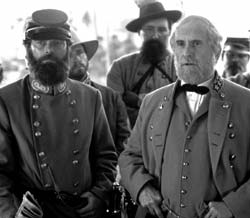Now we know what Ted Turner is going to do with his retirement years. His vanity-production prequel to 1993’s Gettysburg plunges us back into the Civil Warall four hours (!) of it, including intermissionto solemn, stultifying effect. (And yes, Turner has a cameo as a Confederate officer.) Gods and Generals (which opens Friday, Feb. 21 at Meridian and other theaters) is like a glossy 1,000-page issue of Southern Living, thick with antebellum mansions, charming Southern belles, Christmas caroling parties, fresh-squeezed lemonade, and the best-treated slaves I’ve ever seen in a movie. (How many departing Confederate officers do you suppose really kissed their black maids farewell? Or shook hands with their black cooks? Or prayed with them?) Y’all see, the Negroes were happy in their servitudeuntil you damn Yankees invaded our homeland!
Nobody north of the Mason-Dixon line is going to be much interested in this movie, which will find its intended audience on TNN and DVD. I’d say it was a mediocre TV movie if that weren’t an insult to television. Compared to great yet racist films like Birth of a Nation and Gone With the Wind, the tepid, plodding Generals actually manages the feat of making the Civil War dull. It’s full of speeches, not dialogue.
Wallowing in Hallmark-pretty Southern nostalgia, Generals doesn’t even venture North to introduce Jeff Daniels’ liberal Maine professor character for its first hour. More damningly still, for what’s supposed to be a war picture, the Battle of Bull Run doesn’t come until about 90 minutes in. Daniels and his younger brother (C. Thomas Howell) carry on P.C. debates about emancipating the slaves, but Generals is all about the South and all about Gen. “Stonewall” Jackson (Stephen Lang, back, like Daniels, from Gettysburg).
Aside from slavery, what’s the difference between North and South in Generals? Southerners are pious, polite, and honorable. Northerners are, at best, rational. Northerners are driven by politics, Southerners by Godbecause their cause is just. Also, the Southerners have bigger, better, fuller beardsbecause their cause is just. Given such stereotypes, leaden pacing, cheap effects (studios made better matte paintings in the ’20s), and sanitized combat sequences (shouldn’t war be gory and horrible?), there’s little the cast can do to save the cause. Robert Duvall has mellowed a long way from Apocalypse Now‘s Col. Kilgore to weary Gen. Robert E. Lee. Mira Sorvino barely registers and barely avoids embarrassment as Daniels’ fretful wife. As for the hirsute Lang, presumably a decent actor, it’s hard to give a performance with what looks like a muskrat attached to his jaw.
NOW, I’LL ADMIT that I was charmed to see Civil War re-enactors packing the advance screening of Generals at the Guild 45 two weeks ago, in their historically accurate military uniforms (all Confederate, so far as I could tell). Woman wore period dresses and bonnets. Kids even came with their parents, which warms my childless heart. These are good people, not racists who burn crosses on lawns, and I’m not putting them down. On balance, I’d rather spend time with them than the folks who show up dressed in costume for Star Wars or Lord of the Rings. And I’m sure they make better lemonade.
But here’s what truly distresses me about this folly. In the Southerners’ constant invocation of God; in their zealous defense against what they see as invading infidels; in their obdurate, insular, backward-looking parochialism, they remind me of Al Qaeda. (OK, start up the angry e-mail campaign now.) All their biblical references to the oppressed Israelites ring messianic and dishonest. (Just who exactly is in bondage here?) I’m sorry, but in our current contest between piety and modernity, the “our cause is just” stuff seems reactionary and distasteful. What’s worse, it also sounds like Busha carpetbagger and Southerner manqu頩f ever there was oneand his sanctimonious new crusades.
In some ways, Generals is like a Southern retort to Gangs of New York, where the poor and the Irish finally rebelled against conscription. In Scorsese’s otherwise muddled, unconvincing picture, the draft riots were something you actually believedNortherners who didn’t want to die for a cause not their own. This movie replies that white Southerners were willing to die for their cause. I believe that. But, as Daniels’ professor points out, their cause was not just, since it depended on oppressing the rights of the South’s actual majority population.
I wondered if or when the contentious, now-controversial Confederate battle flag would appear in Generals (it’s absent from the opening montage of individual state banners). It took a while, but there’s apparently no keeping an old symbol down. The flick sanitizes the slave systemthe very engine of the 19th-century Southern economyat every opportunity, trying to inoculate itself against charges of racism. Then it raises the standard of Old Southern patriotism as if it’s something worth reviving.
Well, Ted, you can’t have it both ways (although a third movie is planned). If you feel the need to whitewash history, you can’t truly also be proud of the colors in your flag. A better approach will come this Christmas, when the Confederate hero of Cold Mountain will simply turn his back on the carnage and hypocrisy, and then walk home. Another is suggested in John Sayles’ 1996 Lone Star, where Texans struggle with their own tainted past. That film’s last line is “Forget the Alamo,” advice the Civil War crowd would do well to heed.








